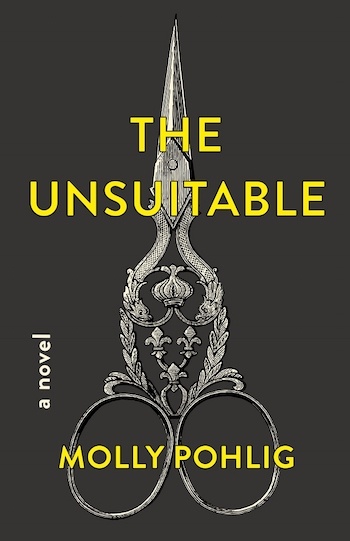Book Review: “The Unsuitable” — A Super Female Superego
By Matt Hanson
The text is littered with accusatory, staccato lines from mama Wince, whose conversations with her daughter achieve Carrie-esque arias of passive aggressiveness.
The Unsuitable by Molly Pohlig. Henry Holt and Co., 288 pages, $26.99.

Esquire Magazine used to run a series of articles called “Ten Things You Don’t Know About Women.” The series presented females offering comments and suggestions about things that guys often misunderstand about them and relationships in general. I used to read it pretty consistently, which is to say slightly desperately, especially during dry spells in my dating life. One piece of advice has stuck with me all these years later: “We secretly like it when you talk shit about our mothers.” Of course, this should be judged on a case-by-case basis — plenty of women I know adore their moms and vice versa. But some definitely don’t. I wonder if this might have something to do with Simone de Beauvoir’s famous statement that “one isn’t born, but rather becomes, a woman.”
Sure, societies dictate certain kinds of gendered behavior from the cradle to the grave, but the first instruction one gets on how to be a person is usually from parents. And I’ve heard horror stories over the years about how women are informed from a young age on precisely how they are expected to act, talk, and think, which must be an unbelievably exasperating way to grow up.
Maybe this is the significance of the metaphor Molly Pohlig draws on in her debut novel The Unsuitable. Its protagonist, Iseult Wince, has the unfortunate fate of having her dead mother speak to her from beyond the grave, courtesy of a scar on her neck. The mythologically named Iseult is haunted by the voice of her overbearing mother, who blames her for causing her death during childbirth. The text is littered with accusatory, staccato lines from mama Wince, whose conversations with her daughter achieve Carrie-esque arias of passive aggressiveness: “i will never leave you Iseult, my little girl, never never. You can’t kill yourself and get away from me. i am tied to you in you around you you you you.”
Her mother’s voice becomes a kind of disdainful Greek chorus that chimes in whenever Iseult needs to make decisions about her life. Iseult is a young woman of marriageable age during the Victorian era: her agency and range of options is drastically limited by the men around her. Tellingly, the problem isn’t just that Iseult’s mother is critical of her daughter — it’s that she insists on playing the victim. Her line of attack goes beyond finding faults in Iseult, though that’s certainly a part of it, it’s that the daughter’s failures are hurting her. People expect to be criticized in life, especially by their parents. But being told that one’s shortcomings are hurting the one who is telling them about it is creates a distinctly powerful emotional scar. And that scar is the one Iseult cannot stop picking at.
Her father, the usual stuffy Victorian type, can’t wait for her to get over all this foolishness and go be some eligible bachelor’s baby maker already. Iseult has all the anger and frustration that comes with being powerless to make decisions about her own life. Compounding the pain is that Iseult’s patience is stretched to the existential breaking point: her mother is constantly speaking to her from beyond the grave by way of her still raw scar. The voice can only be partially silenced by being stabbed or scratched at: “dear he doesn’t mean it he’s being helpful do as he says you know that tooth has always driven you mad … you are the one who has driven me mad, mother. I cannot tell what you would have me do, shall I please them all and land us a husband? Or repel them so we are locked in here forever?”

Author Molly Pohlig. Photo: Bridget B. Williams.
At times, there is a grotesque comedy in Iseult’s predicament. Pohlig homes in on the humor that comes when other people blithely tiptoe around the main character’s all-too-real angst. Iseult is trying to keep the nagging impulses of her mother at bay and think about who she is and what she wants. But at the same time she is pushed hard by social forces beyond her control: “the dressmaker rubbed at her right eyebrow with the back of her hand, which was her nervous habit. She had last seen Iseult’s swanlike neck not three months earlier, and she wasn’t sure how to say that an open, oozing wound was a sure way to ruin a bridal gown… I think we can highlight this lovely neck with some beautiful lace.”
The setting is the Victorian era, which makes sense given its picture of the constriction of gender roles and the somewhat gothic ambience. But this is one reason why the story doesn’t satisfy. We aren’t given much of a sense of the surrounding atmosphere; the environment where the characters live is entirely left up to the reader’s imagination. We only look out at the world from Iseult’s traumatized consciousness — the narrative is claustrophobic rather than dramatic.
Iseult’s seemingly only worthy suitor is an eligible bachelor whose skin is inexplicably a shade of silver. This intriguing concept isn’t really explained; it’s left up to the reader to figure out what this odd physicality might signify. Does it make it easier for the character to relate to the tormented Iseult? Are we going to be treated to a gothic version of geek love? The novel doesn’t really go very far into their relationship, and that is a drawback. It would have been fascinating to have seen how the story line might have been expanded, what with Iseult and her silver suitor trying to become an item amid the nattering and status-seeking stuffiness of the Victorian upper class.
There’s a lot at stake when a novel hinges on a major plot twist. A resolution had better make the time spent reaching it worthwhile. The Unsuitable maintains reader interest and narrative momentum, but the arrival of a major plot twist disappoints. It should have put everything we’ve come to take for granted into startling relief — everything that’s come before should be seen in a very different light. Unfortunately, The Unsuitable’s conceptual framework falls apart. Regardless of whether we guessed Iseult’s revelation was coming, the disclosure feels more like a quick wrap-up of the plot than a genuinely illuminating “big reveal.” And that is what makes Iseult’s story unsatisfying. We are pulled so deeply into what caused her torment that it doesn’t deserve to be ended so expediently.
Matt Hanson is a contributing editor at the Arts Fuse whose work has also appeared in American Interest, Baffler, Guardian, Millions, New Yorker, Smart Set, and elsewhere. A longtime resident of Boston, he now lives in New Orleans.
